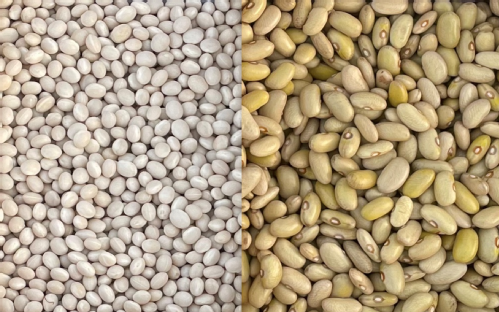
Guardian article mangles language and facts, pulling the wool over the public’s eyes about the real capabilities of GM. By Claire Robinson
In what has become a time-honoured tradition, yet another non-GM breeding success has been proclaimed a triumph of genetic engineering.
The article in question is written by Lucy Carter and published in The Guardian.
The article says that three haricot bean varieties have been developed in the UK. The varieties, named Olivia, Godiva, and Capulet, have been developed by Prof Eric Holub at the University of Warwick. They reportedly “can germinate fast and in cold soils, they have strong root systems and are suitable for planting in May and harvest in September – before the autumn rain sets in. They are also tall enough for a combine harvester to cut them down and harvest the seed pods.”
All this is notable because though haricot beans are popular in the UK – think baked beans – growing them on a commercial scale in the UK is challenging because of the climate. As a result, most of the considerable number of haricot beans consumed in both Britain and Ireland, where baked beans are popular too, are imported from countries as far away as the US, Canada, Ethiopia, and China.
So how was this impressive breakthrough brought about? Prof Holub is clear about the methods used to develop the beans: “There was nothing novel about the technology we used for this initiative, it’s been used for hundreds of years. It’s conventional breeding and genetics.”
A University of Warwick press release explains further that to assist the conventional breeding process, Prof Holub and colleagues used gene or DNA mapping – a biotechnology that is used to identify desirable genes but doesn't produce a GMO. In this case, gene mapping was used to single out “genes for resistance to the bacterial halo blight pathogen and two common viruses that hinder growth and reduce crop yield”.
Yet bizarrely, Lucy Carter – or, perhaps more likely, a tabloid-minded editor – managed to headline her article, “Beans are being genetically engineered to grow in the UK – but how do they taste?”
Genetic engineering – or, as it’s more commonly called in the EU and the UK, genetic modification – has a legal and scientific definition. It means a process that uses lab-based technologies to alter the DNA of an organism by adding, deleting, or modifying DNA, in a way that does not happen naturally. It doesn’t mean conventional breeding, and it doesn't mean gene mapping, the methods that Holub used. Nor does it mean marker assisted selection, a biotechnology technique that can be added to gene mapping to ensure the breeding lines contain the desired genes.
Conventional breeding, unlike genetic engineering, means selecting and crossing sexually compatible plants. Genetic engineering and conventional breeding are totally different and carry very different risks.
The Guardian's blunder was expertly deconstructed by Beyond GM in a thread on X that is well worth reading. Beyond GM commented, “There’s a growing trend among pro-deregulation mouthpieces to try [to] blur the lines between conventional breeding and genetic engineering/gene editing (in UK = PBO) techniques. Some idiots even claim farmers have been ‘genetically engineering’ crops for centuries. This is a lie.”
Innocent, or not?
Was The Guardian’s falsehood an innocent mistake arising from misunderstanding or the pursuit of an attention-grabbing headline? Or was it just the latest in a long history of deception, prompted by the decades-long catalogue of failures of promised GM “solutions”? In this tradition, some of the many under-reported non-GM success stories (multiple examples are here) can end up being claimed as clever GM breakthroughs.
A classic instance was provided by the UK government’s former chief scientist, Prof Sir David King, who repeatedly used non-GM breakthroughs as evidence of why we need to embrace GM. King claimed a big crop yield increase in Africa was due to GM, when it did not involve the use of any GM technology at all, but resulted from a crop management technique commonly used in organic and agroecological farming.
On another occasion, King claimed a big success for GM flood-resistant rice when the crop he was referring to was in reality non-GM.
In its thread on the latest piece of genetically modified nonsense, Beyond GM concluded, “Language matters. Regulation, transparency and public understanding rely on language being used clearly and honestly rather than to mislead over the real differences in how our food is produced. If The Guardian has any journalistic integrity left, it will issue a correction.”
Incidentally, the UK firm Hodmedod's has been selling British-grown baked beans for over 10 years.
Image of Capulet and Godiva beans: University of Warwick










